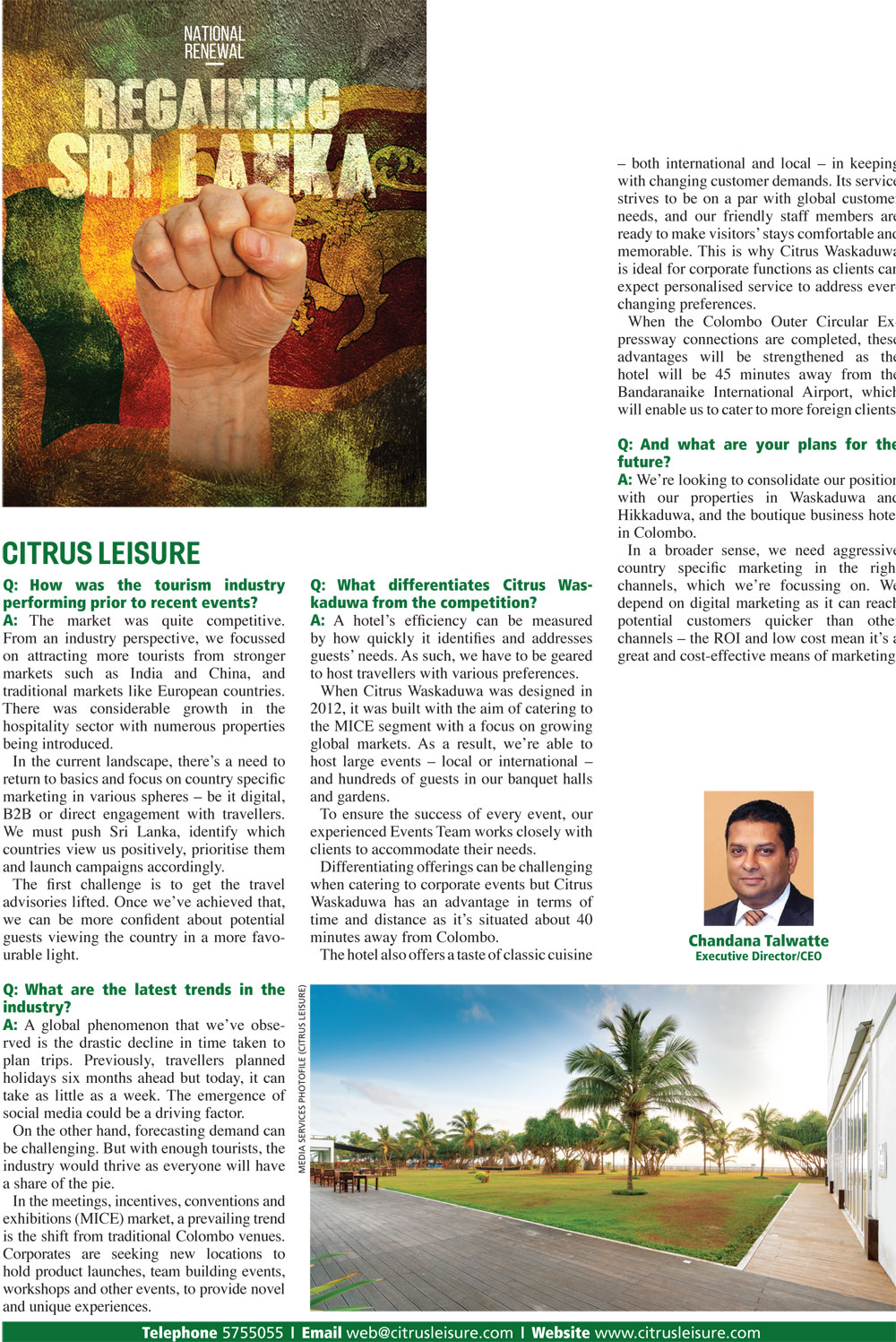ONYX HOSPITALITY GROUP – SRI LANKA
Q: What is your take on recent events and their likely impact?
A: They had a major impact, which was felt across the world.
Low tourist arrival numbers have affected the economy with travel advisories issued by all our key markets. Hotels now have single digit or low double digit occupancy – when in reality, they’re geared for 80 percent year-round occupancy. ONYX has an advantage in being an international operator and is leveraging on its brand reach at this time.
The financial impact on the hospitality sector was felt at the end of May as service charges were extremely low. ONYX has taken measures to secure jobs by relocating some staff to our international hotels on task based assignments.
I firmly believe that Sri Lanka will recover. Estimates stand at a minimum of 12 months to two years for the country to stabilise, which is why a collective effort is needed to rebuild the nation.
Q: Does the country continue to hold a niche for its unique brand of ëSri Lankan hospitalityí?
A: Absolutely. There is a reason why Lonely Planet selected Sri Lanka as its top destination for travel in 2019. This country still has its natural resources, heritage and friendly people, which is what resonates with guests from around the world who visit us.
I’m passionate about what this country has to offer and firmly believe that the more people visit Sri Lanka, the more they will walk away in amazement at what they find here.
Q: In your view, does Sri Lanka have sufficient facilities to cater to what tourists demand?
A: There’s an abundance of natural facilities but infrastructure is necessary for both the movement of tourists and variety of attractions on offer. It is important for Sri Lanka to build on its strengths and unique opportunities such as whale watching.
Colombo has witnessed an improvement with new malls and hotels gracing the skyline. The Colombo International Financial City (CIFC – or Port City as it is also known) will also contribute to this in the future.
The expected influx of international hotels will take the level of hospitality higher and beget a more mature market, adding an international flair to it. However, we should retain the city’s authentic identity.
Q: In your opinion, is enough being done to promote Sri Lanka as a tourism destination?
A: Many attempts have been made but they’re insufficient. The ‘So Sri Lanka’ campaign launched in 2018 has been affected by the political turmoil late last year and Easter Sunday attacks.
Increased participation is needed to push this slogan and create awareness in the international arena. This requires a collective effort from both private and state enterprises with the Sri Lanka Tourism Development Authority leading the way.
Q: How can the sports or MICE segment contribute to industry growth?
A: These segments offer prospects for investment in technology, transport and multipurpose convention facilities. A convention can bring in 2,000 plus people, which benefits not only hotels but also restaurants, bars, vehicle operators and even parks.
If we have a dozen or so of these events a year, it would boost the economy. OZO (Colombo) and Amari (Galle) are oriented to support such an endeavour with their large conference facilities.
Sri Lanka does have sporting activities such as golf and surfing but they’re not adequately promoted by the tourism industry. Amari (Galle) was involved in a skydiving promotion last year, which was a great event. The Ironman Triathlon was also a success.
Promoting similar events and organising international tournaments will contribute to growth.
Russell Cool
Area General Manager
Telephone 2555570 | Email nadia.desilva@onyx-hospitality.com | Website www.onyx-hospitality.com




